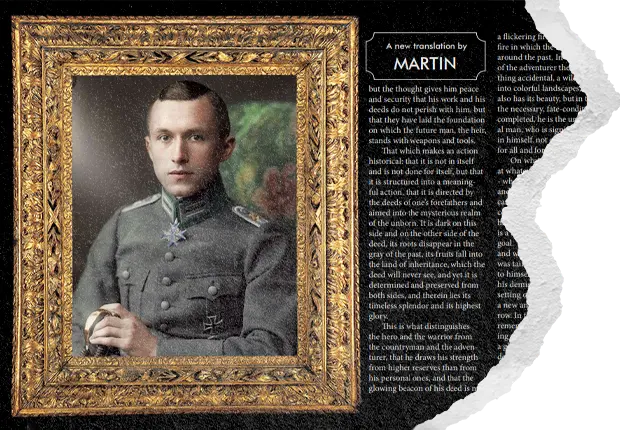Tradition
First published in 1925 in Die Standarte.
Tradition – is a noble and proud word for a race that has the will to put the emphasis back on the side of blood. The individual does not dwell alone in a physical place, but as a member of a community, for which he has to live and, if necessary, to sacrifice himself. That is a realization which probably every man who has a sense of responsibility possesses and defends – in his own particular way and with his own particular means. But the individual is bound not only to a higher community in space, but also in an even more significant, though invisible, way in time. A father’s blood pulses through one’s own, he lives on in realms and bonds that they have created, preserved and defended. Created, preserved and defended, so that he might take the work from their fist into his own and manage it worthily. The man of the present is the center between the past and the future. Life shoots like the glowing spark of a fuse through the bond of the sexes, it burns them out and, nevertheless, establishes a connection which goes from the beginning to the end. Soon the man of the present will also be a has-been, but the thought gives him peace and security that his work and his deeds do not perish with him, but that they have laid the foundation on which the future man, the heir, stands with weapons and tools.
That which makes an action historical: that it is not in itself and is not done for itself, but that it is structured into a meaningful action, that it is directed by the deeds of one’s forefathers and aimed into the mysterious realm of the unborn. It is dark on this side and on the other side of the deed, its roots disappear in the gray of the past, its fruits fall into the land of inheritance, which the deed will never see, and yet it is determined and preserved from both sides, and therein lies its timeless splendor and its highest glory.
This is what distinguishes the hero and the warrior from the countryman and the adventurer, that he draws his strength from higher reserves than from his personal ones, and that the glowing beacon of his deed is not a flickering fire, but the blazing fire in which the future is forged around the past. In the greatness of the adventurer there is something accidental, a wild incursion into colorful landscapes, which also has its beauty, but in the hero the necessary, fate-conditioned is completed, he is the uniquely moral man, who is significant not only in himself, not only today, but also for all and for any time.
On whatever battlefield and at whatever seemingly lost post – where a past is to be preserved and fought for a future, no deed can be lost. The individual can certainly be lost, but his destiny, his happiness and his perfection is a downfall for a higher, further goal. The man without ties dies and with him his work, because it was tailored in its dimensions only to himself; the hero perishes, but his demise is like the blood-red setting of the sun, which promises a new and more beautiful tomorrow. In the same way, we must remember the great war as a glowing sunset, in the colors of which a glorious tomorrow is already determined. So we must think of our fallen friends, and recognize in their demise the sign of completion, the sharpest affirmation of life itself. Far as from disgusting filth, we must refrain from the evaluation of the Kramerseele “that it was all in vain,” if we want to find our happiness in living in the space of destiny and flowing in the mysterious stream of blood, if we want to work in a meaningful, significant landscape, and not vegetate in a time and space in which we have been placed by the accident of birth.
No, birth must not be an accident for us! It is the act that immerses us in our actual earthly realm, and that determines, with a thousand symbolic threads, our place in the life-world. Through it we become members of the nation, the community of those bound by birth. From here we enter life, from a fixed point, but in a movement that began long before us and will end late after us. We are passing through only one section of this vast trajectory, but over this section we must not only carry a full inheritance, but be equal to all the demands of time.
Now, vile minds, debauched in the squalor of our great cities, come up with the wisdom that our birth was a game of chance, and that “we could just as well have been born French as Germans.” Of course, for the one who thinks like that, it is true. He is an accidental man. The happiness that lies in feeling born with necessity into a great destiny, in feeling its tensions and struggles as one’s own, and in rising – or sinking – with it, is foreign to him.
These brains always come out when misfortune weighs on the communities united by birth, and this is characteristic for them. (We should briefly point out the last, very skilful move of the intellect to parasitically and destructively penetrate into the community of blood and to distort its essence intellectually, namely by the term “community of fate”, which at first sight seems to be quite appropriate. But the community of destiny also includes a negro who was taken by surprise at the beginning of the war in Germany, who was drawn into our path of suffering from bread to root vegetables. A “community of destiny” in this sense is formed by the passengers of a sinking steamer, in contrast to the community of blood of the crew of a warship sinking with the flag flying).
The national man values being born into a firmly defined boundary, indeed he sees in it his highest pride. When he transcends his borders, he does so not by flowing formlessly beyond them, but by extending them into the future and into the past. Its strength rests in the fact that it possesses direction, and with it a more instinctive security, an orientation from the ground up, which is given to the blood, and which does not need the fluctuating and changing signal lanterns of sophisticated concepts. Thus life grows into a greater unity, and thus it becomes itself a unity by being meaningfully bound in each of its moments.
Sharply delineated by its boundaries, by sacred rivers, fearsome mountains and vast seas, the life of a national race fixes itself in space. Based on a tradition and directed towards a distant future, it is fixed in time. Woe to him who cuts off his own roots, he becomes an impotent, a parasitic man. To deny the past is also to deny the future, and to perish with the volatile waves of the present.
But for the nationalist there is an equally great danger, that is that he forgets the present. Having tradition implies the duty to live out this tradition. The nation is not a house on which each generation, like a generation of coral, only has to add a new story, or in whose space, set once and for all, it only has to exist in a bad way. A castle, a solidly built suburban house, seems to be set once and for all after its completion. But soon a new generation, out of new needs, sees the necessity of important changes. Or it burns down, it is destroyed, and a new, different building rises above the old foundation walls. The facades change, every stone is replaced, and yet, in a very special sense, it remains the same house. Was it the perfect house only in the Renaissance or in the Baroque, did it have then a style that is valid forever? No, but what it was then is somehow hidden in what it is today.
Today it is perhaps coolly structured as an expression of a feeling in values of the highest, active energy, but this expression is only conceivable on the layered ground of a tradition. In every line and in every scale, the past mysteriously resonates, and yet it is the present that determines the face of the whole, so that it lifts us up, carries us away in the feeling: this is us, this is ourselves! And so it must be.
So also the blood of the individual is mixed from a thousand dark bloodstreams, and yet the individual is not only the sum of his ancestors, not only the bearer of their will and qualities, but also in distinct, bounded peculiarity – he is he himself. And the same is the case with the most comprehensive form of the nation, with the state. Yesterday we had an empire, today we have a republic, tomorrow perhaps another empire, and the day after tomorrow a dictatorship. Each of these structures, as an invisible inheritance, more or less hidden under its formal language, also carries the content of the former, but each has the duty to be completely itself, because only in this way the full utilization of the power is achieved.
This is true also in this exact minute for every one of us. To be an heir is not to be an imitator. And to live in a tradition does not mean to limit oneself to this tradition. To inherit a house means to take care of it, but not to make a museum out of it, in which the ancestral home stands untouched. “His Kingdom [Reich] is for ever,” said Luther, who laid the axe to the building of a church; he knew that a kingdom and a building, a power and its temporal expression are not the same.
“His Kingdom is for ever” – so too for us, and in this will to the essential lies our real tradition, for which one can stand up just as sharply under the roof of a republic as under that of an empire. The important thing is that the great current of blood forces all the resources and institutions of the time into its service. Whether you fight a battle with the methods of a republic or with those of a board of directors, it amounts to the same thing – if only you win it. In the age of the cold steel one must know how to win with the sword, in the age of the machine with machine guns, tanks, bomb squadrons and gas attacks. In a patrimonial age, an army must believe in fighting for its king and lord; in an age of the masses, it may desire to go to the death for any progress of a social or economic nature. Always his ideas, his faith and his morality will shimmer, yes, must shimmer, in the colorful reflections of temporal illumination, but what matters is not his insights, questions and apparent goals, but that all his power be realized within the framework of the “kingdom.”
This realization is also our duty. We, too, must try to put the tremendous, bound energy of the modern state at the service of the empire, to wrest it from the clutches of the rational intellect, and to subject it to the laws of blood down to the last flywheel, the last bit of iron. Only then will we live tradition. We are still far from it. It is precisely the emphasis on the external form of tradition, which is characteristic of the national youth of today, that is a sign of a lack of inner strength. We do not live in museums, but in an active, hostile world. It is not a living tradition that old Fritz is painted on every cigar box, and that every ashtray and every pair of trousers receives its black-and-white bread stamp. This is advertising in the worst sense, just as the majority of our parades, commemorations and honorary days are only the most tasteless advertising, cast-iron kitsch, through which one gains nothing but followers.
Prepare yourselves for a new Rossbach in the most characteristic formations of our time, then the old one up there will be most pleased. Do not write Frederick novels, but the national novel of our time, whose material is as multifarious as life itself before your eyes. Do not live as dreamers in sunken times, but try to give the Republic clout and power directed by the current of blood, or smash it in two if it does not want to become tough. Do not reminisce about the cane of Frederick William II, which was essential in his time, but recognize that such methods of social control depend on the times, and that today it is essential to find a solution that will include the worker in the national front, as has already been done in other countries.
Be fully who you are; then you will be living both the future and the past in the fiery focus of the present and in your own deeds. Then you will have real, living tradition and not only its flickering reflection that can be placed in any suburban cinema.

































